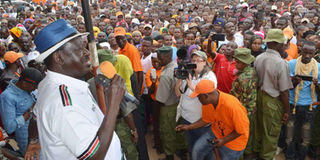Tight race in Raila’s fourth attempt

Nasa leader Raila Odinga addresses a rally at Hola Stadium in Tana River County on July 22, 2017. Nasa is seeking to exploit its national appeal linked to its ethnic diversity. PHOTO | KEVIN ODIT | NATION MEDIA GROUP
What you need to know:
- The ability of the IEBC to conduct credible elections will be a key determinant of the outcome.
- Nasa has some power brokers who will be crucial in delivering the strongholds and swing counties.
With less than two weeks to go to the General Election, it’s all hands on deck for National Super Alliance (Nasa) presidential candidate Raila Odinga and his running, Mr Kalonzo Musyoka.
While not a new concept, the formation of a super alliance with five key principals from diverse ethnic groups, coupled with a devolved government, a relatively autonomous Judiciary, and populist “movement for change” zeitgeist, has seen Mr Odinga’s odds to win the presidency steadily increase.
VOTER TURNOUT
The alliance’s ability to execute an effective elections strategy will be vital, considering that Mr Odinga’s strongholds have historically registered low voter turnouts.
The ability of the Independent Electoral and Boundaries Commission (IEBC) to conduct credible elections will be a key determinant of the outcome.
This will be Mr Odinga’s fourth — and possibly final — attempt to secure the big office.
PRIME MINISTER
Over the years, he has become skilled at opposition politics, having played kingmaker for former President Mwai Kibaki in 2002.
This was followed by his contribution to creating the Orange Democratic Movement (ODM), which in the 2005 referendum, successfully opposed the implementation of a new constitution.
His greatest political success came in 2007 when he became the Prime Minister, a post created under a caretaker government after the 2007/08 post-election violence.
RIGGING
Mr Odinga is the flagbearer of the super alliance, which is brimming with confidence, but also banging a drum around perceived efforts by the incumbent to manipulate the results.
This could set the scene for a contested election outcome.
The rebirth of the pentagon structure under Nasa follows a multi-ethnic representation narrative, as Jubilee Party is deemed to be dominated by Kikuyus and Kalenjins.
ICC CASE
Although the represented tribes in Nasa remain largely the same as in 2007, the political landscape has changed significantly over the past 10 years.
Notably, the post-election violence allegations against Mr Uhuru Kenyatta and Mr William Ruto in the International Criminal Court (ICC) — a crucial bond for their 2013 election victory — no longer exists.
There is also general frustration over the recurring Kikuyu/Kalenjin presidency, with parts of the electorate calling for change over perceived governance failures.
ADVISERS
This is around national security, food security, and inconsistencies in the infrastructure development, on which Jubilee’s campaign is anchored.
Nasa has some power brokers who will be crucial in delivering the strongholds and swing counties.
Governors Hassan Joho (Mombasa) and Josphat Nanok (Turkana) can win key constituencies for Nasa.
Both have openly tussled with President Kenyatta, who has lambasted them.
This has worked in Nasa’s favour by degrading the Executive voice.
RIFT VALLEY
The inclusion of Bomet Governor Isaac Ruto in the new pentagon could also earn Nasa some vital votes in the Rift Valley.
Mr Ruto, who has a historical rivalry with Deputy President William Ruto, has developed his stature as a respected politician in the Rift Valley and nationally.
Mr Musalia Mudavadi and Mr Musyoka, who also harbour presidential ambitions, are pushing to be in government to remain relevant, in the emergence of younger exciting politicians.
IEBC
Although Jubilee has the incumbency advantage, a first-round victory by Mr Odinga cannot be ruled out.
However, the IEBC’s questionable credibility and preparedness reduces the odds of such a victory.
A second-round victory would have the odds tipped narrowly in Jubilee’s favour despite growing momentum in the opposition campaign.
ETHNICITY
Nasa’s strategy includes shaming the government and key players and discrediting the administration to push the populist ‘change’ narrative.
This has been driven through an effective social media campaign.
Nasa is also seeking to exploit its national appeal linked to its ethnic diversity — despite some of the sensitivities entailed in such identity-based politics.
Nasa has also voiced concern over IEBC’s independence and preparedness.
OPINION POLL
This serves the twin aim of discrediting the authorities to win sympathy, and providing the grounds for contesting any potential loss.
President Kenyatta and his Jubilee administration maintain a narrow advantage heading into the poll.
However, a consistent campaign by Nasa could see this lead erode further, replicating similar opposition campaigns witnessed in several other recent African elections.
Ms Cheramboss is an intelligence and analysis consultant at Africapractice EA Ltd. Twitter: @africapractice




